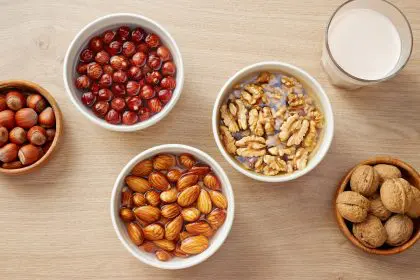A groundbreaking study has revealed that choline, a nutrient found in everyday foods, might be the key to better heart health. While you’ve probably never given much thought to this vital compound, you might have taken choline-rich foods and research suggests it could significantly reduce your risk of heart disease, America’s leading cause of death. The implications of this discovery are reshaping our understanding of nutrition and heart health.
Understanding the choline connection
- Scientists have discovered that the right amount of choline in your diet could protect against atherosclerotic heart disease. The recent study published in BMC Public Health analyzed data from over 5,500 Americans, finding that those with moderate choline intake showed notably lower risk of cardiovascular problems. This extensive research provides compelling evidence for choline’s role in heart health maintenance.
- However, the relationship isn’t as simple as “more is better.” The research indicates that both too little and too much choline might miss the sweet spot for heart health benefits. This delicate balance explains why eating choline-rich foods, rather than supplements, often proves more effective. Understanding this nuanced relationship helps explain why previous studies sometimes showed conflicting results.
- Women should aim for approximately 244 milligrams of choline daily, while men need about 367 milligrams for optimal heart benefits. Interestingly, these amounts actually fall below current government recommendations, suggesting that moderate intake might be more beneficial than previously thought. This discovery challenges traditional nutritional guidelines and opens new discussions about optimal nutrient levels.
- The study found no significant connection between choline and metabolic syndrome, indicating that choline’s heart-protective effects likely work through other mechanisms. This discovery opens new avenues for understanding how dietary choices impact cardiovascular health and suggests that choline’s benefits might be more specific than originally believed.
Natural sources for better heart health
Your body thrives on choline from whole food sources. Registered dietitian Kiran Campbell recommends incorporating a variety of choline-rich foods into your daily meals. These include whole eggs, various fish species, dairy products and lean meats. The natural combination of nutrients in these foods may enhance choline’s beneficial effects.
Plant lovers needn’t worry about missing out. Red potatoes, shiitake mushrooms, nuts, seeds, whole grains and cruciferous vegetables all provide significant amounts of choline. These sources offer the added benefit of being naturally low in saturated fat and rich in other heart-healthy compounds like fiber and antioxidants.
Creating heart-healthy habits
While choline plays a crucial role, protecting your heart requires a comprehensive approach. Regular physical activity, maintaining a healthy weight and avoiding tobacco use work synergistically with proper nutrition to support cardiovascular health. This holistic approach maximizes the benefits of optimal choline intake.
Research continues to uncover new aspects of choline’s relationship with heart health. Current evidence suggests that this nutrient helps maintain proper cell function and may reduce inflammation, both crucial factors in preventing heart disease. Scientists are particularly interested in how choline influences cellular repair mechanisms and membrane stability.
The inflammation connection
Recent studies indicate that appropriate choline levels might help manage chronic inflammation, a key factor in heart disease development. This anti-inflammatory effect appears strongest when choline comes from whole food sources rather than supplements, highlighting the importance of dietary choices.
Choline plays a vital role in maintaining cell membrane integrity and supporting proper cellular communication. These functions prove particularly important for heart muscle cells, which must maintain precise coordination for proper heart function.
Making smart dietary choices
Campbell emphasizes the importance of choosing lean proteins and plant-based choline sources when possible. This approach ensures you get adequate choline while avoiding excessive saturated fat intake, which could counteract the heart-healthy benefits. Planning meals around these principles helps optimize both choline intake and overall nutrition.
Incorporating choline-rich foods throughout your day doesn’t require dramatic dietary changes. Simple swaps and additions can significantly increase your choline intake while maintaining familiar eating patterns. Consider adding eggs to your breakfast, including nuts in your snacks, or serving fish for dinner.
Understanding individual needs
Individual choline requirements may vary based on factors like age, gender and overall health status. Consulting with healthcare providers can help determine the right approach for your specific situation. Genetic factors may also influence how effectively your body processes and utilizes choline.
Certain populations may need to pay particular attention to their choline intake. Pregnant women, athletes and older adults often have increased choline requirements. Understanding these special needs helps ensure adequate intake for optimal health.
The future of heart health
Ongoing research promises to reveal more about how choline influences cardiovascular health. Scientists continue exploring optimal intake levels and potential mechanisms through which this nutrient protects the heart. New studies may uncover additional benefits or refine our understanding of optimal intake levels.
Current investigations focus on how choline interacts with other nutrients and lifestyle factors to influence heart health. This research may lead to more personalized recommendations based on individual health profiles and genetic factors.
Your action plan
Start by incorporating more choline-rich foods into your meals gradually. Focus on whole food sources and combine them with other heart-healthy habits like regular exercise and stress management. Keep track of your progress and any changes you notice in your overall health.
Remember that sustainable changes happen gradually. Rather than making dramatic dietary overhauls, focus on slowly increasing your intake of choline-rich foods while maintaining overall balanced nutrition. This approach helps ensure long-term success in maintaining heart-healthy habits.
Tracking your progress
Consider keeping a food diary to monitor your choline intake and identify areas for improvement. This practice can help you maintain awareness of your dietary choices and make adjustments as needed.
As research continues to unveil the complexities of choline’s role in heart health, one thing remains clear: This essential nutrient deserves attention in your daily diet. Through mindful food choices and lifestyle habits, you can harness its protective benefits for better heart health.
The journey to optimal heart health continues as scientists uncover more about choline’s role in cardiovascular wellness. By staying informed and making conscious dietary choices, you can take advantage of this knowledge to protect and enhance your heart health for years to come.











